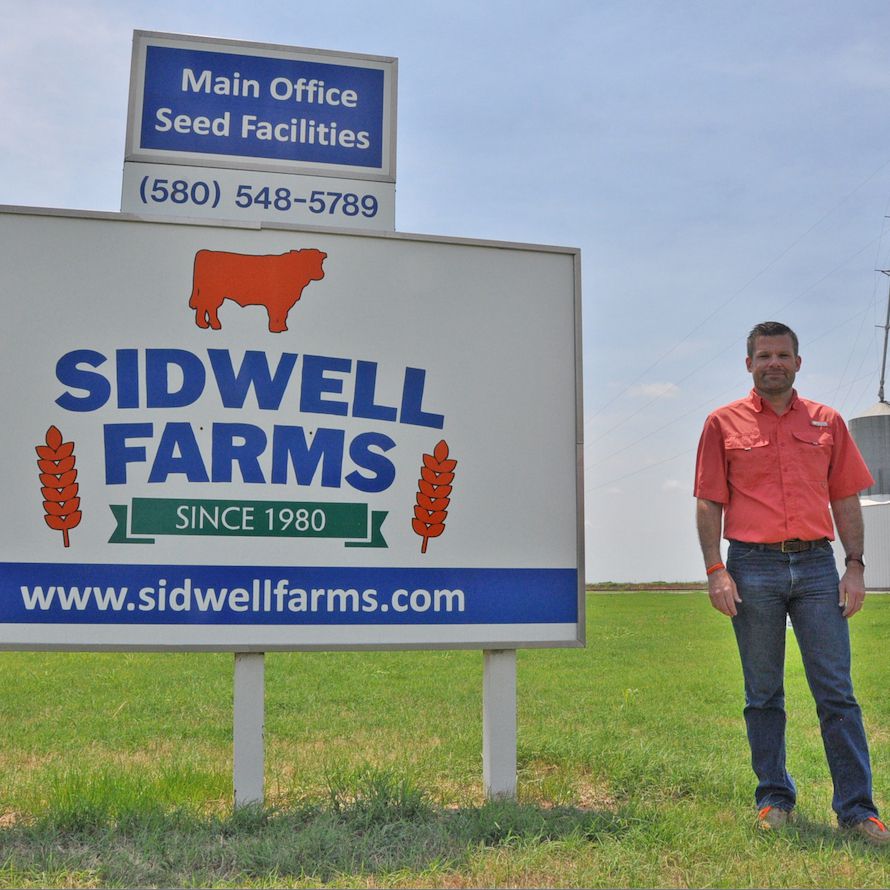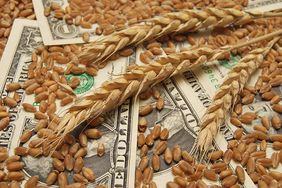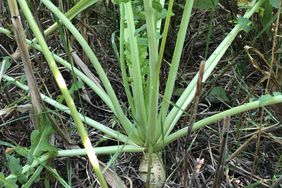
Wheat and farming shaped the legacy of Brady Sidwell's family. But it wasn't until his father's death in 2013 that the younger Sidwell began to grasp the depth of that legacy and the role he might play in carrying it forward. He couldn't have foreseen that he would one day translate his family's wheat farming history into integrated supply chain businesses connecting farmers to consumers and food-supply businesses.
For 34 years his father, Raymond Sidwell, loomed large in the wheat-breeding pro-gram at Oklahoma State University's North Central Research Station, where he served as senior station superintendent. Together with his wife, Brenda, who launched Sidwell Insurance Agency, he also built a family farm near Goltry, Oklahoma, where Brady grew up along with his sister, Bambi.
Educational and employment pursuits took the younger Sidwells away from the farm. Upon his father's death, Brady flew home from Asia to take over the management of Sidwell Farms (sidwellfarms.com). "One's legacy really only begins to manifest itself once we start learning to live without the people who built it," he says.
While Sidwell pondered his approach to building on his father's legacy, he faced immediate practical needs. There was a 2,000-acre farm to run; a certified-seed business to manage; cattle to care for; and crops of wheat, barley, corn, soybeans, milo, and hay to grow and harvest.
Growing a Passion
The work clarified his passion and shaped his goals. "My passion for agriculture com-plemented my interest in working in food supply chains, as I had done in my previous jobs," he says. "I grew a passion for helping local producers access local supply chains that introduce producers to consumers."
Over time, four businesses arose from Sidwell's passion. He bought a grain elevator in Kremlin, Oklahoma, that became the heart of his first business, Enterprise Grain Co. "It represents the first step in the supply chain right after the farm," he says. "We source local grains and specialty crops."
To add value to the grains and further integrate the local supply chain, Sidwell and a partner in 2021 launched Chisholm Trail Milling, located in Enid. (See "The Story Behind the Flour." - below)
"We process local grains into whole-grain flour and package it into 2.5-pound and 40-pound bags for sale to wholesale customers," he says. "We currently provide fresh, stone-milled, whole-grain flour to restaurants and other retail customers in Oklahoma, Louisiana, Florida, New York, Colorado, and Illinois."
To ensure the quality of the grain entering the supply chain, he recruits growers of hard red winter wheat and offers quality premiums based on grain protein, he says. "We segregate grains by variety to be milled into the flours best suited for bread flour, pastry flour, and cookie flour, for instance," he adds. "Our flours are distinguished by grain variety and are identity preserved starting at the elevator."
Some wheat varieties headed into the supply chain have their origins in his father's work at Oklahoma State University.
Along with selling wheat to Chisholm Trail Milling, the grain business also sells wheat to larger flour mills. The elevator also con-tracts with farmers for the purchase of specialty grains such as sesame, mung beans, barley, and durum wheat. To acquire hard red winter wheat, the elevator contracts with as many as 80 farmers from Oklahoma and Kansas. Ten producers presently fill the elevator's needs for specialty crops.
Enid Brewing Co.
A smaller, but fully integrated grain-to-glass and farm-to-table business Sidwell set up is Enid Brewing Co. "We use locally grown wheat and barley to make the beer," he says.
Launched in 2019, the brewery also features an eatery offering baked goods made from flours milled at Chisholm Trail Milling and beef produced at Sidwell Farms.
Sidwell runs a herd of 80 beef cows and finishes the calves in a feedlot on the farm. The finishing grain ration includes "spent" grains, a by-product of the brewing process at Enid Brewing Co. "We market about 20% to 30% of our cattle through the brewery, and the balance of our beef goes to the farm-to-table restaurants we work with," he says.
As consumer interest grows in sourcing locally produced food, Sidwell sees a complementary marketing opportunity for food produced regeneratively from land verified by a carbon market. "We will begin to see increasing demand from consumers interested in knowing the carbon intensity of their food," he notes.
New practices at Sidwell Farms are opening doors to carbon markets. Sidwell is increasingly adopting no-till and minimum-till, cover crops, and variable-rate nitrogen application.
Sidwell's latest acquisition also represents a new enterprise. "I recently acquired a distribution facility, which is the next step in putting together the infrastructure needed to get local products to market," he says. "Being able to get locally produced, artisan food products marketed at a meaningful scale is where there's a need in local supply chains."
While Sidwell is presently most interested in fine-tuning processes and products rather than expanding, he does see the opportunity for his business models to be replicated in other communities. "I also see an opportunity for us to be a part of those new start-ups," he says.
"We're helping build and rebuild rural communities by helping more local producers get their products into the supply chain," he adds. "It's time to bring dreams to life. My dad's legacy lives on."
:max_bytes(150000):strip_icc()/Graison20Gill20and20Brady20Sidwell20looking20at20wheat-2-2000-fac6838010204c04b86f131950cfa2fb.jpg)
The Story Behind the Flour
Flavor is a key Graison Gill looks for in the grains to be milled into flours for his baked goods. Such attention to detail led to his nomination in 2020 for the Best Baker in America by the James Beard Foundation and put his New Orleans-based Bellegarde Bakery on the map.
Midway through his baking career, he set out to find varieties of wheat bred for taste rather than yield. "I called wheat breeders throughout the South," he says, "and finally found success at Oklahoma State University."
Gill started sourcing wheat berries from Oklahoma and hauling them to Louisiana to be milled into the flours he used in his bakery.
But he had a vision for something more. He envisioned the building of a mill in Oklahoma, close to where the wheat was grown. He wrote a business plan and reached out to Oklahoma entrepreneur and wheat producer Brady Sidwell.
The two put their heads together and partnered in the building of Chisholm Trail Milling, which sourc-es grains from farmers in Oklahoma and Kansas to be stone-milled into whole-grain flours for every type of baking product.
"The quality of the flour is incredible," says Gill. "Because it's stone-milled, it's not refined. Every ingredient has an identity, and this has the thumbprint of being grown in Oklahoma."
Says Sidwell: "Our customers value the way that we've integrated our supply chain and our ability to source consistently high-quality raw material and then process the flour fresh."
To broaden their customer base, they find creative ways to "tell our story," says Sidwell. Agritourism pro-vides one means of doing that.
"We have an Airbnb near Sidwell Farms, and we invite people like restaurant managers and chefs to come out for a visit," he says.
"Not only is this an opportunity for them to see our integrated process, but it also gives them a farm experience. Universities have also been willing to share the story of our supply chain integration and opportunities.
"Among farmers, we have found a lot of interest in being able to market local products," says Sidwell. "Along with that, we've found that restaurants and grocery stores are increasingly realizing that their consumers are interested in buying locally produced products. We're trying to find ways to help more of us find each other."
- Learn More
- Brady Sidwell
- 580/232-2272
- brady@sidwellfarms.com











